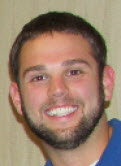An Idea Mapping Success Blogs Weblog
Part 2 of Introducing the First Idea Mapping Guest Blogger – Chris Kordick
15Aug2015 Filed under: Interviews Author: Jamie Nast Part 1 of this interview was posted on August 12, 2015. This is the second of three posts about Chris Kordick who is the first Idea Mapping Guest blogger. Currently Chris is in his first year of med school at Lake Erie College of Ostepathic Medicine.
Part 1 of this interview was posted on August 12, 2015. This is the second of three posts about Chris Kordick who is the first Idea Mapping Guest blogger. Currently Chris is in his first year of med school at Lake Erie College of Ostepathic Medicine.
Following are questions 4-7 of my interview with Chris:
4. How did you apply the Idea Mapping and memory tools to help you study or the MCAT? What were the results?
Idea Mapping for the MCAT was difficult, though, at times it became very beneficial. Certain parts of the MCAT require one to utilize equations and stone-cold factual information, which made the dynamic structure of Idea Mapping difficult for me to harness; however, I was able to utilize it for much of the biological sciences section. Things like human physiology and microbiology were great subjects to map because a majority of the questions asked on the exam were thought questions.
5. How are you applying the Idea Mapping and memory tools today?
I use them in a few different ways today. In my application to medical school, I used the tools to map things like my personal statement and essay questions. I feel that it helped me create drafts of documents that were crisp and appealing, rather than long-winded. Also, by using the mapping tools during my academics, I have noticed that I have become a more creative thinker during the course of the day. If asked a question, or trying to solve a problem, I’ve noticed that I have become more abstract in my thinking. Studying in the sciences, I have always been told that things are logical by nature. After becoming efficient at Idea Mapping, I’ve noticed myself thinking more creatively by straying away from the black and white; instead, I find myself asking “What if…?”
6. How do you plan to apply the Idea Mapping and memory tools while at Med School?
I plan to use them primarily on my text and lecture reviews because of the efficiency they provide me while studying; however, things like the “Roman Room” will be great to use when going over things that require rote memory.
7. Do you envision using these tools in your profession as a physician?
To be honest, it’s a bit early for me to give a solid answer, however, because these tools allow me to recall large amounts of information quickly while allowing me to retain my creativity, I think that I will find many ways to harness the power of Idea Mapping.
Thanks Chris for your time. Look for the third and final interview, some of Chris’s idea maps fresh from Med School, and future blogs from this brilliant young man! I look forward to sharing the final interview with you.
Idea Mapping Blog
The purpose of this blog is to share idea mapping examples and related learning from my Idea Mapping, Memory, Speed Reading, and Certification Workshops. This blog is dedicated to my Certified Idea Mapping Instructors, my clients, Mind Mapping and Idea Mapping practitioners around the globe.
![[Ask]](http://ideamapping.ideamappingsuccess.com/IdeaMappingBlogs/wp-content/plugins/bookmarkify/ask.png)
![[del.icio.us]](http://ideamapping.ideamappingsuccess.com/IdeaMappingBlogs/wp-content/plugins/bookmarkify/delicious.png)
![[Digg]](http://ideamapping.ideamappingsuccess.com/IdeaMappingBlogs/wp-content/plugins/bookmarkify/digg.png)
![[Facebook]](http://ideamapping.ideamappingsuccess.com/IdeaMappingBlogs/wp-content/plugins/bookmarkify/facebook.png)
![[Google]](http://ideamapping.ideamappingsuccess.com/IdeaMappingBlogs/wp-content/plugins/bookmarkify/google.png)
![[MySpace]](http://ideamapping.ideamappingsuccess.com/IdeaMappingBlogs/wp-content/plugins/bookmarkify/myspace.png)
![[Slashdot]](http://ideamapping.ideamappingsuccess.com/IdeaMappingBlogs/wp-content/plugins/bookmarkify/slashdot.png)
![[Sphinn]](http://ideamapping.ideamappingsuccess.com/IdeaMappingBlogs/wp-content/plugins/bookmarkify/sphinn.png)
![[StumbleUpon]](http://ideamapping.ideamappingsuccess.com/IdeaMappingBlogs/wp-content/plugins/bookmarkify/stumbleupon.png)
![[Technorati]](http://ideamapping.ideamappingsuccess.com/IdeaMappingBlogs/wp-content/plugins/bookmarkify/technorati.png)
![[ThisNext]](http://ideamapping.ideamappingsuccess.com/IdeaMappingBlogs/wp-content/plugins/bookmarkify/thisnext.png)
![[Twitter]](http://ideamapping.ideamappingsuccess.com/IdeaMappingBlogs/wp-content/plugins/bookmarkify/twitter.png)
![[Webride]](http://ideamapping.ideamappingsuccess.com/IdeaMappingBlogs/wp-content/plugins/bookmarkify/webride.png)
![[Email]](http://ideamapping.ideamappingsuccess.com/IdeaMappingBlogs/wp-content/plugins/bookmarkify/email.png)
Leave a reply